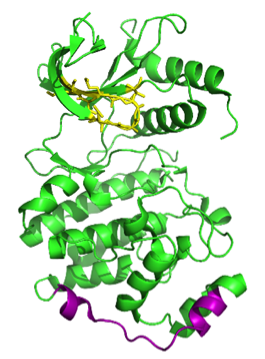Finding moonlighting proteins, in genomes, which perform two independent functions
04-26-2016
Most of proteins in a genome are assigned with single function; however, an increasing number of proteins are found to have multiple functions. Moonlighting proteins are a class of proteins that show multiple cellular functions within a single polypeptide chain. Moonlighting proteins are vital in important cellular processes, signaling pathways and disease progression. Moonlighting proteins are also interesting for considering evolution of genomes, because these proteins gained additional functions at a certain point in evolution. However, the current knowledge on experimentally identified moonlighting proteins is still insufficient to obtain a comprehensive picture of the cellular mechanisms underlying their functional diversity. Hence, a systematic bioinformatics approach for identification of moonlighting proteins could make substantial contributions to gain a thorough understanding of the underlying biology of their multi-functional nature.
Professor Kihara and a graduate student in his group, Ishita Khan, have recently developed computational approach that identifies potential moonlighting proteins based on the proteins omics features. Since moonlighting proteins are involved in multiple functions, they tend to interact, both physically and genetically, with proteins with different functions. This is similar to the idea that one's activity may be speculated from friends he or her interacts with, maybe from the friend list on the social network service, such as Facebook. The developed method named MPFIT (Moonlighting Protein Finding Tool) combines multiple such features of proteins using machine learning methods and predict if a protein is moonlighting or not. MPFIT showed very high accuracy on a dataset of known moonlighting proteins and non-moonlighting proteins, and moreover, predicted that 2-10% of three genomes, Saccharomyces cerevisiae, Caenorhabditis elegans, and Homo sapiens, are probably moonlighting proteins.
The work is an imperative step toward a systematic approach of studying moonlighting proteins and it will open up new opportunities to investigate the multi-functional nature of proteins at a systems level. The paper has been recently published on Bioinformatics.
References:
- Ishita K. Khan & Daisuke Kihara "Genome-scale prediction of moonlighting proteins using diverse protein association information", Bioinformatics, in press, http://bioinformatics.oxfordjournals.org/content/early/2016/03/26/bioinformatics.btw166.short?rss=1 Epub (2016)
